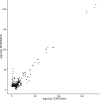Common Genetic Polymorphisms Influence Blood Biomarker Measurements in COPD
- PMID: 27532455
- PMCID: PMC4988780
- DOI: 10.1371/journal.pgen.1006011
Common Genetic Polymorphisms Influence Blood Biomarker Measurements in COPD
Abstract
Implementing precision medicine for complex diseases such as chronic obstructive lung disease (COPD) will require extensive use of biomarkers and an in-depth understanding of how genetic, epigenetic, and environmental variations contribute to phenotypic diversity and disease progression. A meta-analysis from two large cohorts of current and former smokers with and without COPD [SPIROMICS (N = 750); COPDGene (N = 590)] was used to identify single nucleotide polymorphisms (SNPs) associated with measurement of 88 blood proteins (protein quantitative trait loci; pQTLs). PQTLs consistently replicated between the two cohorts. Features of pQTLs were compared to previously reported expression QTLs (eQTLs). Inference of causal relations of pQTL genotypes, biomarker measurements, and four clinical COPD phenotypes (airflow obstruction, emphysema, exacerbation history, and chronic bronchitis) were explored using conditional independence tests. We identified 527 highly significant (p < 8 X 10-10) pQTLs in 38 (43%) of blood proteins tested. Most pQTL SNPs were novel with low overlap to eQTL SNPs. The pQTL SNPs explained >10% of measured variation in 13 protein biomarkers, with a single SNP (rs7041; p = 10-392) explaining 71%-75% of the measured variation in vitamin D binding protein (gene = GC). Some of these pQTLs [e.g., pQTLs for VDBP, sRAGE (gene = AGER), surfactant protein D (gene = SFTPD), and TNFRSF10C] have been previously associated with COPD phenotypes. Most pQTLs were local (cis), but distant (trans) pQTL SNPs in the ABO blood group locus were the top pQTL SNPs for five proteins. The inclusion of pQTL SNPs improved the clinical predictive value for the established association of sRAGE and emphysema, and the explanation of variance (R2) for emphysema improved from 0.3 to 0.4 when the pQTL SNP was included in the model along with clinical covariates. Causal modeling provided insight into specific pQTL-disease relationships for airflow obstruction and emphysema. In conclusion, given the frequency of highly significant local pQTLs, the large amount of variance potentially explained by pQTL, and the differences observed between pQTLs and eQTLs SNPs, we recommend that protein biomarker-disease association studies take into account the potential effect of common local SNPs and that pQTLs be integrated along with eQTLs to uncover disease mechanisms. Large-scale blood biomarker studies would also benefit from close attention to the ABO blood group.
Conflict of interest statement
The authors have declared that no competing interests exist.
Figures








Similar articles
-
Systemic soluble receptor for advanced glycation endproducts is a biomarker of emphysema and associated with AGER genetic variants in patients with chronic obstructive pulmonary disease.Am J Respir Crit Care Med. 2013 Oct 15;188(8):948-57. doi: 10.1164/rccm.201302-0247OC. Am J Respir Crit Care Med. 2013. PMID: 23947473
-
Integrating Genetics, Transcriptomics, and Proteomics in Lung Tissue to Investigate Chronic Obstructive Pulmonary Disease.Am J Respir Cell Mol Biol. 2023 Jun;68(6):651-663. doi: 10.1165/rcmb.2022-0302OC. Am J Respir Cell Mol Biol. 2023. PMID: 36780661 Free PMC article.
-
Genome-wide association analysis of blood biomarkers in chronic obstructive pulmonary disease.Am J Respir Crit Care Med. 2012 Dec 15;186(12):1238-47. doi: 10.1164/rccm.201206-1013OC. Epub 2012 Nov 9. Am J Respir Crit Care Med. 2012. PMID: 23144326 Free PMC article. Clinical Trial.
-
Omics and the Search for Blood Biomarkers in Chronic Obstructive Pulmonary Disease. Insights from COPDGene.Am J Respir Cell Mol Biol. 2019 Aug;61(2):143-149. doi: 10.1165/rcmb.2018-0245PS. Am J Respir Cell Mol Biol. 2019. PMID: 30874442 Free PMC article. Review.
-
Genetic Advances in Chronic Obstructive Pulmonary Disease. Insights from COPDGene.Am J Respir Crit Care Med. 2019 Sep 15;200(6):677-690. doi: 10.1164/rccm.201808-1455SO. Am J Respir Crit Care Med. 2019. PMID: 30908940 Free PMC article. Review.
Cited by
-
Metabolomics and transcriptomics pathway approach reveals outcome-specific perturbations in COPD.Sci Rep. 2018 Nov 20;8(1):17132. doi: 10.1038/s41598-018-35372-w. Sci Rep. 2018. PMID: 30459441 Free PMC article.
-
Endothelial injury, F-actin and vitamin-D binding protein after hematopoietic stem cell transplant and association with clinical outcomes.Haematologica. 2021 May 1;106(5):1321-1329. doi: 10.3324/haematol.2019.233478. Haematologica. 2021. PMID: 32241849 Free PMC article.
-
Decreased fucosylation impacts epithelial integrity and increases risk for COPD.bioRxiv [Preprint]. 2023 Nov 2:2023.10.31.564805. doi: 10.1101/2023.10.31.564805. bioRxiv. 2023. PMID: 37961411 Free PMC article. Preprint.
-
NetSHy: network summarization via a hybrid approach leveraging topological properties.Bioinformatics. 2023 Jan 1;39(1):btac818. doi: 10.1093/bioinformatics/btac818. Bioinformatics. 2023. PMID: 36548341 Free PMC article.
-
Systemic Markers of Inflammation in Smokers With Symptoms Despite Preserved Spirometry in SPIROMICS.Chest. 2019 May;155(5):908-917. doi: 10.1016/j.chest.2018.12.022. Epub 2019 Jan 23. Chest. 2019. PMID: 30684474 Free PMC article.
References
Publication types
MeSH terms
Substances
Grants and funding
- K01 HL125858/HL/NHLBI NIH HHS/United States
- UL1 RR025780/RR/NCRR NIH HHS/United States
- U01 HL089897/HL/NHLBI NIH HHS/United States
- HHSN268200900016C/HL/NHLBI NIH HHS/United States
- R01 HL125432/HL/NHLBI NIH HHS/United States
- HHSN268200900014C/HL/NHLBI NIH HHS/United States
- R01 HL089897/HL/NHLBI NIH HHS/United States
- HHSN268200900019C/HL/NHLBI NIH HHS/United States
- HHSN268200900009C/WH/WHI NIH HHS/United States
- P30 ES010126/ES/NIEHS NIH HHS/United States
- P30 CA015704/CA/NCI NIH HHS/United States
- T32 ES007142/ES/NIEHS NIH HHS/United States
- P30 ES005605/ES/NIEHS NIH HHS/United States
- K12 HL119997/HL/NHLBI NIH HHS/United States
- R01 HL089856/HL/NHLBI NIH HHS/United States
- U01 HL089856/HL/NHLBI NIH HHS/United States
- HHSN268200900015C/HL/NHLBI NIH HHS/United States
- HHSN268200900018C/HL/NHLBI NIH HHS/United States
- P30 DK054759/DK/NIDDK NIH HHS/United States
- HHSN268200900017C/HL/NHLBI NIH HHS/United States
- HHSN268200900020C/HL/NHLBI NIH HHS/United States
- HHSN268200900013C/HL/NHLBI NIH HHS/United States
- R01 HL124233/HL/NHLBI NIH HHS/United States
LinkOut - more resources
Full Text Sources
Other Literature Sources
Medical
Molecular Biology Databases
Miscellaneous

